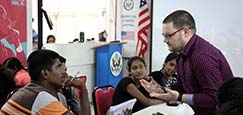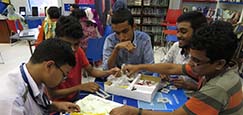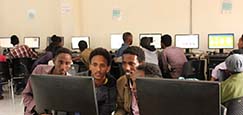Six Pillars of American Spaces
American Spaces programs showcase the breadth and depth of American values, ideals, culture, and perspectives on a variety of themes. Public Diplomacy sections worldwide develop and implement programs and activities in American Spaces that further posts’ Integrated Country Strategy (ICS) goals and that align with the PD section’s Public Diplomacy Implementation Plan (PDIP) as well as the needs and interests of key audiences.
All American Spaces programs are aligned within its Six Pillars, outlined below:
Information about the United States: As gateways for host nation audiences to learn about American society, culture, and values, American Spaces present information that is accurate and balanced, current, and audience-appropriate, and which helps posts shape the narrative about the United States, especially when faced with foreign disinformation or propaganda. American Spaces offer multimedia collections of books, films, newspapers, and more. American Spaces also provide WiFi and Internet access, as well as access to eLibraryUSA (eLibraryUSA.state.gov), which offers video streaming services, online newspapers and magazines, research databases, and other information services.
Host Strategic Cultural Programs: American Spaces offer cultural and other types of programs that represent the full range of American culture and society, engage many different local audiences, provide opportunities for foreign audiences to interact with Americans, and reflect U.S. foreign policy priorities. Cultural programs may focus on a wide variety of areas related to American society, such as the visual and plastic arts, film, performing arts, literature, health, food culture/cuisine, sports, science and technology, U.S. policy and values (such as democracy, rule of law, civil rights, the free market, and good governance), elections, volunteerism, makerspace activities, environment, civil society, and entrepreneurship – introducing host nation audiences to virtually any aspect of culture, from an American perspective. This Pillar encourages posts and their American Spaces to take advantage of the full scope of cultural programming resources offered by the State Department.
Promote Study in the United States through Educational Advising Programs: Whether by hosting an EducationUSA Advising Center and activities or providing public access to EducationUSA educational advising reference materials, American Spaces conduct a variety of educational advising services that promote higher education in the United States. Programs in this Pillar are conducted in-person and virtually, and feature alumni of U.S. educational institutions, and current and past participants in educational exchange programs to encourage foreign students to study in the United States.
Promote English Language Teaching and Learning: American Spaces offer a wide range of programs free of charge that build the skills of English language teachers and promote English language learning in all demographic sectors, including among underserved audiences. Often working closely with Regional English Language Officers (RELOs), programs in this Pillar may include clubs, teacher training workshops, and activities led by Fulbright English Teaching Assistants, English Language Fellows, Peace Corps Volunteers, and other facilitators and take advantage of the many instructional and professional development/teacher training resources provided by the State Department.
Offer Skills Development (Capacity Building) Programs: Programming in the Skills Building Pillar empowers young and professional audiences to develop skills in a wide array of areas that will help them meet local and global challenges and support inclusive and sustainable economic growth and opportunity. This programming Pillar draws on a wide range of expertise and resources, including Department public-facing resources, the private sector, and local experts, to teach critical skills relevant to the local economy and community.
Lead Alumni Engagement Programs: American Spaces frequently engage alumni of U.S. exchange programs and cultural enrichment programs as guest speakers, volunteers, and local advisors. Whether they lead programs, serve as volunteers, or participate as members of a larger audience by sharing their U.S. experience relevant to the program theme, alumni have an understanding of both American and local culture and language, which enables them to present American perspectives in a way that resonates with local audiences.




